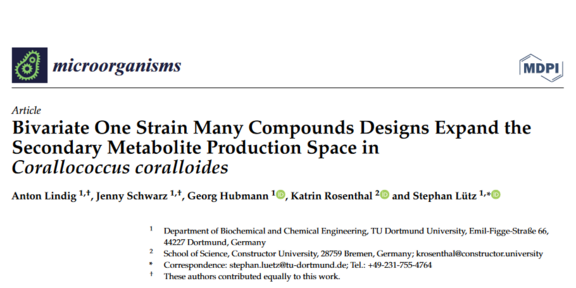Detailseite für das News-Plug-In auf der Startseite
New publication in Microorganisms

Natural products from bacteria play an important role in the development of new drugs, such as antibiotics. A promising representative of bacteria as a producer for new bioactive natural products is the myxobacterium Corallococcus coralloides. Genome analyses have shown that C. coralloides still possesses many unknown biosynthetic gene clusters for potentially new natural products. However, the majority of these biosynthetic gene clusters remain inactive under standard cultivation conditions in the laboratory. Targeted activation is often observable by simply changing the cultivation conditions in the "One Strain Many Compounds (OSMAC)". In the newly published article, we developed a multifactorial OSMAC method and applied it to the discovery of new natural products in C. coralloides. In the new bivariate OSMAC approach, two cultivation conditions, e.g., changing the medium, adding solvents, and/or adding biotic additives, are simultaneously altered to better mimic the complex living conditions in a natural environment in the laboratory, thus enabling the discovery of new natural products. Anton Lindig, Jenny Schwarz, and coauthors were able to show that this bivariate OSMAC method was able to detect more masses in number, as well as more specific masses, in extracts from cultivation approaches. Establishing this multifactorial OSMAC method will make the discovery of new and promising molecules in C. coralloides and other natural product producers more efficient in the future.







